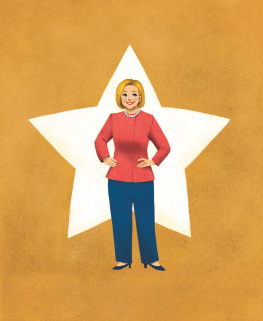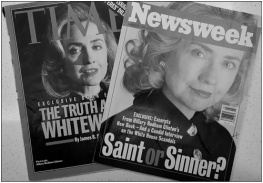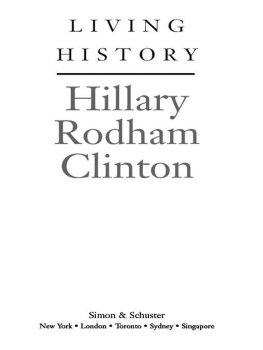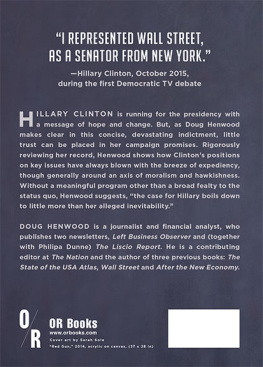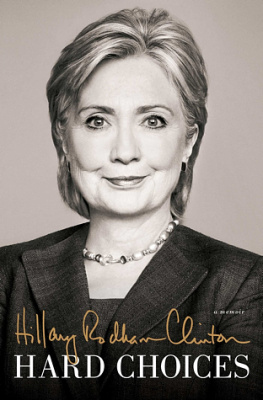In the classic American tradition, Hillary Rodham was born to a family of strivers parents who, with pluck and luck, hurdled obstacles to rise above their own familys history and achieve success. They showed her the way to her own even more remarkable ascent.
In her mothers case, the handicaps were harrowing. Dorothy Howell was born in 1919 to Chicago firefighter Edwin Howell, Jr., and his wife Della Murray. Neither one had any talent or desire to raise children. When Dorothy was three, Della began leaving her for days at a time in the familys fifth-floor walkup. The child sustained herself with meal tickets at a restaurant down the street. Edwin was a heavy drinker. When her parents defied working-class ideas of morality by divorcing, they sent Dorothy and her sister Isabelle to live with Edwins parents in Alhambra, California, a suburb of Los Angeles. Dorothy was just eight; her sister was three. The girls traveled by themselves on the four-day train journey, with Dorothy in nominal charge of her sister.
Life was not any easier in Los Angeles. The girls grandmother, Emma Howell, demanded obedience. She discouraged Dorothys social life and enforced strict rules with draconian punishment. Once, Hillary wrote, when she caught my mother trick-or-treating with school friends, Emma decided to confine her to her room for an entire year, except for the hours she was in school. Dorothy wasnt allowed to linger in the front yard on her way to or from class or even to eat at the family table. Months later, Emmas visiting sister managed to end the sentence.
Dorothy took refuge in a world of books and became a good student. At fourteen, she escaped her grandmothers house by taking a job as a live-in nanny for a family with two young children. She earned $3 a week, as well as room and board. She also got her first glimpse of a functioning family: Her employers were good parents who gave their children love, care, and a sense of values. Somehow, she took in the example.
But Dorothys mother betrayed her again. Dorothy was set to graduate from Alhambra High School and hoped to go on to one of Californias public colleges. For the first time in ten years, Della wrote her. She asked Dorothy to come back to Chicago to live with her and her new husband, who would pay for Dorothys education. Dorothy went because, she once told Hillary, Id hoped so hard that my mother would love me that I had to take the chance and find out. It was soon clear that Della wanted her daughter as a housekeeper, and there would be no money for schooling. Angry and heartbroken, Dorothy moved into a small apartment of her own. She found the first of a series of office jobs that finally led to her meeting and marrying a traveling salesman named Hugh Rodham .
Hughs father, Hugh Sr., had been born into a large family of Welsh-descended miners and laborers in the industrial city of Scranton, Pennsylvania. He started work as a boy at the Scranton Lace Company and worked his way up to supervisor. He was a gentle, easy-going man who doted on his energetic, independent-minded wife, Hannah. She started her own business, buying houses on credit and renting them out, and used all three of her names: Hannah Jones Rodham.
Hugh Jr. lacked the intellectual bent of his brothers Willard and Russell. Willard grew up to become an engineer; Russell, a doctor. Hugh was a mischievous boy who got in trouble for such stunts as roller-skating up the aisle of the Methodist church during evening prayers. When he graduated from Central High School, he followed his father into the lace factory. But his best friend had been recruited for the Penn State football team and talked the coach into taking Hugh on as well. Hugh played with the Nittany Lions, cultivated a knack for making bathtub gin, and graduated in 1935. He had a degree in physical education, which he discovered was worthless in the depths of the Great Depression.
Eager to make his own life, Hugh hopped a freight train to Chicago and found a job as a traveling salesman. He peddled drapery fabrics to retailers across the Midwest. Hannah didnt want him to take the job, but Hughs father argued that work was hard to find. The family could use his paycheck. Hugh Jr. signed up and drove back to Scranton most weekends to share his wages with his parents.
Dorothy Howell met Hugh at a textile company where she was applying for a job. She was attracted his dark good looks, self-assurance, and sense of humor. But given her parents history, she was wary of marriage. In time, Hugh won her over. They married in early 1942. The Japanese attack on Pearl Harbor had launched the United States into World War II, and Hugh enlisted in the Navy. He became a chief petty officer at the Great Lakes Naval Station and trained thousands of young recruits for sea duty. After the war, he opened his own wholesale fabric business in Chicagos Merchandise Mart and later set up a plant for silk-screen printing of fabrics.
Hugh and Dorothy were living in a small apartment in Chicagos Lincoln Park neighborhood when Hillary, their firstborn, arrived on October 24, 1947. When Hillary was about three, they moved to the first house she remembers. It was a two-story brick home with two sundecks, a screened porch, and a fenced yard in the comfortable middle-class suburb of Park Ridge, fifteen miles northwest of the downtown Loop. Hugh Rodham, a strict conservative who didnt believe in borrowing, paid cash for the house. He ran his business the same way, never going into debt. Hugh, Jr., was born in 1950, and Tony followed in 1954. They were raised in the style of the fifties. They had a stay-at-home mother who fed them soup and bologna sandwiches, kept the home tidy, and gave them unstinting care and attention.
Hillarys mother favored reading over television. Card games and board games furnished supplementary lessons in arithmetic, the discipline of rules, and the importance of playing well with others. Children had the run of their neighborhoods in those days, and there were plenty of them, part of the postwar bumper crop that became the boomer generation. Hillarys family spent every August at the rustic cabin Grandfather Rodham had built on Lake Winola in the Pocono Mountains northwest of Scranton. There, she and her brothers explored the woods and the surrounding countryside, boated and fished on the lake and the Susquehanna River, and learned first-hand about rural poverty. The Rodham cottage lacked a bathtub or shower and had no source of heat except the wood-burning stove in the kitchen.
Hugh Rodhams conservatism carried over into his politics. He was a straight-ticket Republican who detested communists, dishonest businessmen, crooked politicians, and any government nose in his business. He abhorred waste and pinched every nickel. His children did chores but got no allowance for small purchases. I feed you, dont I? Hugh would demand if anyone raised the subject. His wife, however, had learned compassion and empathy from her own difficult childhood. She tempered his views with her own style of moderate liberalism. Since neither of them hesitated to speak out, there were often lively and sometimes heated discussions around the dinner table. Hillary learned that there was room for opposing opinions and that disagreeing didnt make someone evil or your enemy.
Park Ridge had good schools staffed by good teachers. (Hillary never entirely appreciated this fact until, years later, she became chairman of the Education Standards Commission in Arkansas.) At her mothers insistence, she learned to resist peer pressures and stand up to bullies. She became co-captain of the safety patrol and a Girl Scout. And she took the lead in organizing activities for the children in her neighborhood. An old clipping from the



